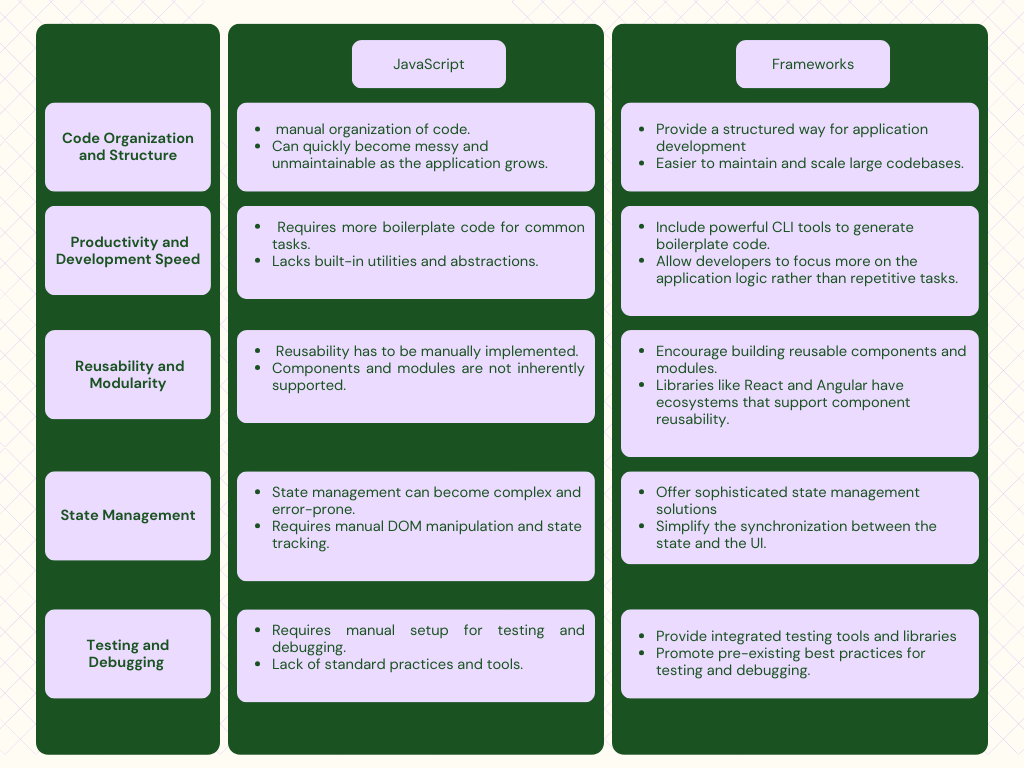Why companies prefer to JavaScript Frameworks rather than JavaScript
Advantages of Framework over JavaScript | 4 min
Introduction
Almost all modern browsers render the website using JavaScript, the reason to prefer JavaScript is performance and speed of execution.It uses DOM ( Document Object Model )is a programming interface for web documents, where it allows programs and scripts to dynamically access and update the content, structure, and style of a document. Let’s see about
Why JavaScript ?
Why we need Frameworks
Types of Frameworks
How to Choose Frameworks
Why JavaScript ?
There are many advantages compared to it’s competitors like dart, Python, Go, PHP etc.,
Universal Browser Support
Large Ecosystem ( collections of libraries, frameworks, tools )
Full-Stack Development ( used for both front end and back end development )
Community Support ( One of Largest Community in the planet )
Asynchronous Programming Know more
Popularity and Job Market
Why we need Frameworks ?
But it is always recommended to learn JavaScript before you dive into any frameworks. The knowledge of JavaScript is essential to get better understanding of how frameworks works and it is easier to debugging and lot more. You will get to know the advantages when you work on JavaScript Frameworks.
Types of Frameworks
1. Front-End JavaScript Frameworks
These frameworks are primarily used for building the user interface and handling the client-side logic of web applications.
React
Developed by Facebook, React is a library (often called a framework due to its ecosystem) for building user interfaces using a component-based architecture. It uses a virtual DOM to optimize updates and offers a powerful declarative programming model.
Angular
Developed by Google, Angular is a comprehensive framework for building single-page applications (SPAs). It uses TypeScript, offers two-way data binding, dependency injection, and a robust CLI for scaffolding applications.
Three JS
Three.js is a popular JavaScript library that simplifies the creation of 3D graphics in web applications. It leverages WebGL, a web standard for rendering 3D graphics within any compatible web browser without the need for plugins.
Sample Website
Credits to Ellie Goulding / Commissioned by Interscope Records / Universal Music.
2. Back-End JavaScript Frameworks
Node.js
While not a framework itself, Node.js is a runtime that allows for server-side JavaScript execution. It is the foundation for many back-end frameworks.
Express.js
A minimal and flexible Node.js web application framework that provides robust features for web and mobile applications. It is known for its simplicity and ease of use.
3. Mobile App Development Frameworks
React Native
Developed by Facebook, React Native allows developers to build native mobile apps using React. It provides native components for a smooth user experience on both iOS and Android.
NativeScript
Allows for building truly native mobile apps with Angular, Vue.js, or plain JavaScript. It provides direct access to native APIs.
The above examples are list of some popular frameworks. And you can explore apart from this.
How to Choose Frameworks
There are currently more than hundreds of JavaScript frameworks available, ranging from small and simple libraries to comprehensive and complex frameworks.
But Choosing the right framework for your project would be great beneficial for better outcome of the project. It depends on various ascepts like
Type of applications ( Backend, Frontend, Mobile development )
Learning Curve
Community and Ecosystem
Performance and Scalability
Maintainability and Long-Term Viability
At the end of the day, it all depends upon you which framework should you work on.
Conclusion
JavaScript serves as the cornerstone of modern web development, enabling dynamic and interactive experiences across the internet. While it's powerful on its own, frameworks provide structured approaches to building applications, enhancing productivity, and ensuring code quality.


